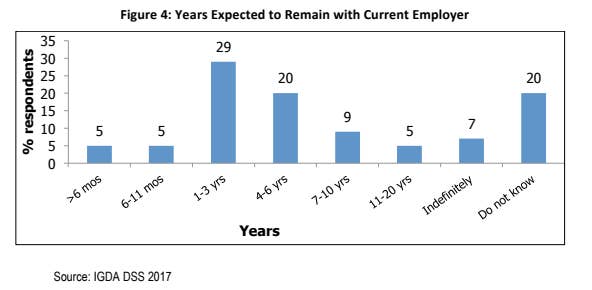IGDA highlights diversity, talent retention issues
Developer group backs off crunch, saying it wants to address wider spectrum of issues identified in latest survey
Two years ago, the International Game Developers Association launched its 2016 Developer Satisfaction Survey with an eye toward tackling the persistent problem of crunch and unpaid overtime in the games industry. After hearing from developers, the plan was to produce a list of companies in the industry who handle crunch periods well, and possibly to name and shame the worst offenders when it comes to uncompensated crunch.
That plan has been abandoned as part of an overall shift in organizational priorities, as IGDA interim executive director Jen MacLean explained to GamesIndustry.biz.
"After careful consideration, the IGDA thought it was important to expand their work beyond crunch and look at all of the ways in which game developers experience challenges in creating fulfilling and sustainable careers," MacLean said. "Crunch is only one of the many challenges game developers around the world face, and the IGDA is working on a larger set of resources to help address many of the issues highlighted in the DSS."
The two issues the IGDA focused on with the 2017 Developer Satisfaction Survey, the results of which were released this week, are diversity and stability in the work place. While this year's DSS found improvement in some aspects, MacLean said other findings "should be troubling for every person who loves the creation, business, or play experience of games."
"Game developers continue to recognize the need for diversity in the workplace, in the industry, and in game content, with developers scoring these items as important in higher rates than ever before," MacLean said. "However, while the overwhelming majority of game developers recognize the importance of diversity, game development as a profession can still be unwelcoming, with half of survey respondents asserting that they do not believe there is equal treatment of developers, and half of respondents witnessing or experiencing inequity."
Those trends could be moving in the desired direction, as 84% of respondents felt diversity in the games industry was very important or somewhat important, the highest mark in four years. (2015 saw the lowest percentage of that sentiment, with only 66% of respondents believing diversity in the industry was important.) Similarly, diversity in game content was more prized than in previous surveys, with 85% saying it was "somewhat" or "very important" compared to 82% in 2016 and 71% in 2015.
"Also concerning are the statistics around tenure in the industry, number of employers over the past five years, and intent to stay with current employers," MacLean said. "Respondents report an average of 2.2 employers in the past 5 years, and self-employed contractors report working the most hours and also receiving the least compensation. Put simply, game development is at risk of losing the most experienced talent in the industry, and without proper support and protection, freelancers may bear the burden of the industry's changing talent profile."

Respondents were clearly aware of that professional instability. 39% expected to remain with their current employer for three years or less. 27% of those who took the survey had already worked for three to five employers in the past five years alone. 64% had been in the industry for less than 10 years, and only 44% believed their profession had a clear career path to follow.
As for crunching, only 18% of respondents received paid overtime. Fully 37% received no additional compensation at all for working beyond normal office hours. For those who did receive additional compensation, 37% said it came in the form of free meals, while 32% said it would be made up in future time off. A little over half of developers (51%) said their work involved crunch time, with another 44% reporting that they had to work extended hours at times that they didn't feel qualified as crunching.
Only 35% of respondents said their employer pays for maternity leave, with 33% paying for paternal leave. When combined government-employer programs were included, the responses rose to 53% and 48%, respectively.
The 2017 IGDA DSS was conducted from February to March of 2017, and compiled 963 responses from developers, academics, journalists, and other professionals connected to the games industry.
